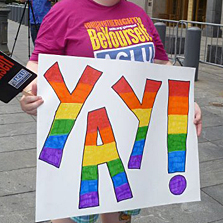
As most everyone has heard by now, the 9th Circuit Court of Appeals, in a historic opinion today affirmed that Proposition 8 — the California state constitutional amendment that took away the right to marry from same-sex couples — violates the equal protection guarantee of the federal constitution. “Proposition 8 serves no purpose, and has no effect, other than to lessen the status and human dignity of gays and lesbians in California, and to officially reclassify their relationships and families as inferior to those of opposite-sex couples. The Constitution simply does not allow for laws of this sort.”
The 9th Circuit is the first federal appellate court to rule that a marriage ban for same-sex couples is unconstitutional, and the decision is one for the history books as a watershed moment for LGBT equality. But beyond the big picture victory, it’s worth it to focus on a couple of aspects of the court’s decision. First, the court really got what marriage is all about — and why it’s different from domestic partnerships. As the court found, “the designation is important because ‘marriage’ is the name that society gives to the relationship that matters most between two adults. A rose by any other name may smell as sweet, but to the couple desiring to enter into a committed lifelong relationship, a marriage by the name ‘registered domestic partnership’ does not.” The court then went on to list the many historical and cultural references to marriage, like the Marilyn Monroe movie How to Marry a Millionaire, and to say that none of these would convey any of the same meaning if you substituted “registered domestic partnership” for marriage. The point might seem silly, but it’s exactly right.
The court also got that the reasons for Prop. 8 cited by its proponents—responsible procreation, protecting religious freedom, and preventing children from being taught about same-sex marriage in school—actually have nothing to do with Prop 8. When the court says that “simply taking away the designation of ‘marriage’ ...did not do any of things its Proponents now suggest were its purposes,” the court means that, yes, the Yes on 8 folks lied to California voters. Neither marriage nor Prop 8 made any changes to the parenting laws in California, religious freedom in California, or what gets taught in schools in California. Instead, Prop. 8 took away marriage from gay and lesbian Californians just to take away marriage from gay and lesbian Californians. Whether based on a desire to uphold tradition or simply prejudice, declaring a minority group unequal just to declare them unequal is not a legitimate or constitutional basis for any law.
For all its inspiring rhetoric, however, the Perry decision doesn’t decide marriage for everyone (even marriage for Californians is still subject to appeal and likely to end up before the U.S. Supreme Court). But we should take the momentum on marriage generated by Perry and work towards marriage in other states — currently, marriage bills are pending in Washington, Maryland, and New Jersey; marriage will likely be on the ballot in Maine in November; and there are anti-gay marriage amendments proposed in Minnesota and North Carolina. Because getting other relationship protections like domestic partnerships is also progress toward marriage, the ACLU has domestic partnership cases pending in Montana, Alaska, Michigan, and Missouri.
If you want to help the Prop. 8 case win in the end, call your legislators if marriage is before your state's legislature, or donate to the campaigns where marriage will be on the ballot this fall, or support those state-focused lawsuits. And above all, talk to your friends and co-workers about why marriage is important to you.

